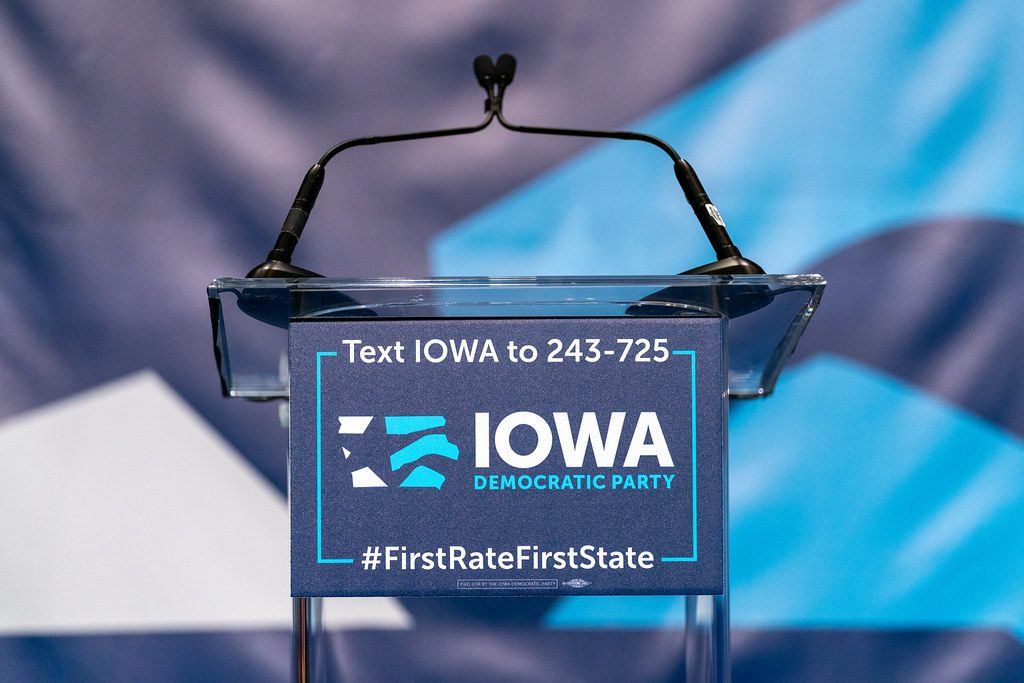
A tumultuous and chaotic debacle at the Iowa Democratic Caucuses Feb. 3 has provoked much angst and grumbling within the Democratic Party, sown confusion into the presidential nomination race and placed the continuing preeminence of the Iowa Caucus under fire.
Reforms enacted after the chaotic clash at the 1968 Democratic National Convention in Chicago established the modern presidential nominating contests. Since 1972, Iowa has held the marquee event of the nominating contests for the Democratic and Republican Parties.
The state has long drawn criticism, particularly crescendoing this year over its representativeness. Iowa is more than 85 percent white in a steadily diversifying nation and many members in the Democratic Party have called for a change in its placement. The debacle places Iowa’s delicate position as the first nominating contest, which has been under steadily mounting scrutiny, even more in doubt.
Defenders of the Iowa Caucus have noted two key advantages. One, that Iowa is a relatively small state where voters put a premium on retail politics so candidates that are less well-known nationally or have fewer resources have a shot to vault into the national spotlight by winning the Iowa Caucus. Famously, President Carter went from an obscure figure to eventually securing the Democratic nomination gaining prominence by winning the Iowa Caucus in 1976.
The second value of Iowa is that Iowa voters notably take the process seriously. Operatives who have worked presidential races in Iowa note that it is not unusual for the same voters to go to events for several candidates as they try to make up their minds, and by all indications Iowa maintained this reputation for diligence this year.
However the story of dysfunction in the Iowa Democratic Party (IDP) has been the leading story following the caucuses instead of any story about the putative winners. The Democratic presidential hopefuls were placed in an awkward position when the state party struggled to collect and release results.
To recap, the complicated Iowa Caucuses work much differently than the direct voting primaries where throughout a day voters simply go to a voting place and cast a private ballot for a candidate of their choice.
At the Iowa Caucus voters had to show up to specific caucus sites at a specific time. When they gather there, speeches are made by supporters of each candidate, and then there is the first vote. In the first vote, voters gather in clusters by the candidate they support. Then the caucus officials count how many people are in a grouping for each candidate. Candidates need support from 15 percent of the total caucus goers at a site to be viable. If a candidate reaches viability, the supporters cannot realign, but for everyone whose candidate did not reach viability on the first vote, they either can realign on a second vote or choose to leave.
This year, in a reform for greater transparency pressed for by supporters of Sen. Sanders after his narrow loss to Hillary Clinton in the Iowa Caucuses in 2016, the Iowa Democratic Party (IDP) will release three sets of numbers: a candidate’s voters on the first round, a candidate’s voters on the final round of voting, and the candidate’s state delegate equivalent (SDE), which will be used to determine how many delegates to the national convention that candidate will garner. The IDP has encouraged all media to take the SDE result as the winner of the Iowa Caucus.
According to reports out of Iowa, there is no singular reason for the disorder in Iowa but rather a combination of failures by the state party. The state had invested in a new app made by the company Shadow to allow precinct chairs to report results. However it appears the party never trained its volunteers in how to use the app, and even for those who could log on, the app did not function as it was intended to.
When the precinct chairs resorted to previous methods and attempted to call in results, many found phone lines to be completely jammed and had difficulty reaching party headquarters. It was not until late Tuesday that the IDP released even partial results.
The process has resulted in much grumbling from the presidential candidates themselves and alighted swift criticism of the state party from many Democrats. Along with the organizational failures, many have criticized the state party for its initial statement explaining that they were not releasing the results for “quality control” and for generally being uncommunicative during the crisis. Indeed, members of various presidential candidate campaigns have complained about being hung up on when they tried to get information out of party headquarters the night of the caucuses.
Though the vote total is still apparently showing inconsistencies, and the AP, along with other media organizations, are refusing to call it, the IDP has announced that former South Bend mayor, Pete Buttigieg, won 14 delegates, closely followed by Sen. Bernie Sanders, who won 12, Sen. Elizabeth Warren, who won eight, and former Vice President Joe Biden, who won six. Sen. Sanders also is leading in both the first vote totals and the realignment vote totals.
Notably, former Vice President Joe Biden underperformed expectations set by his own campaign. Biden campaign officials had confidently predicted that the former vice president would be viable in more areas than he ended up in reality.
The race continues with the nation’s first primary in New Hampshire Feb. 11, closely followed by the Nevada Caucus Feb. 22 and the South Carolina primary, rounding out the first round of nominating contests Feb. 29. Following South Carolina is Super Tuesday, when over a dozen states will hold their nominating contests. Former New York City Mayor Michael Bloomberg, who chose not to contest the first four nominating contests, has been investing hundreds of millions of dollars in the Super Tuesday states.
